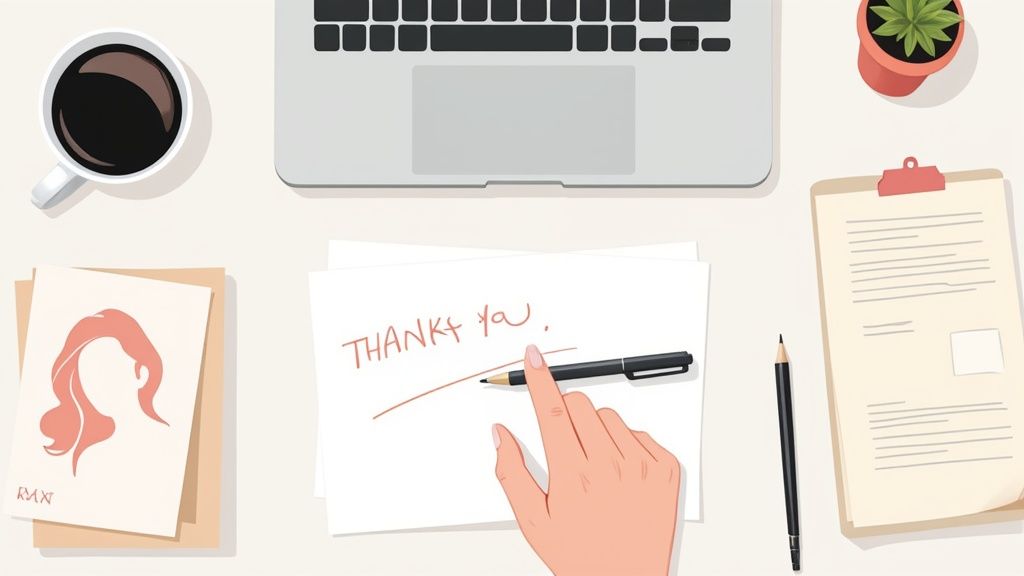
After Interview Thank You Letter: Master the Follow-Up
Published
Why Your After-Interview Thank You Letter Matters More Than You Think
Following up after a job interview with a thank you letter might seem like a small gesture, but it can make a big difference. It's a valuable opportunity to restate your interest in the position, demonstrate your professionalism, and leave a lasting positive impression. This simple act can sometimes be the deciding factor when choosing between equally qualified candidates.
The Psychology of Gratitude and Professionalism
A thank you letter shows more than just good manners; it reflects your professionalism and attention to detail. Hiring managers value these qualities because they indicate a candidate's commitment and respect for the hiring process. Expressing gratitude also strengthens the positive connection you built during the interview, which can be particularly important in a competitive job market.
Standing Out From the Crowd
Many candidates don't send thank you notes after interviews. A Career Center report found that approximately 57% of job seekers skip this step. Explore this topic further. This represents a significant missed opportunity. A well-written thank you letter can set you apart from the competition. It shows initiative and genuine interest, qualities that hiring managers appreciate.
Cultural Expectations and Missed Opportunities
In many industries, a thank you letter is not just good practice, it’s expected. Not sending one can be seen as a lack of interest or even disrespectful. This can hurt your chances, even after a great interview. Consider two candidates with similar qualifications and interview performance. The candidate who sends a thoughtful thank you note demonstrates more enthusiasm and professionalism, giving them a distinct advantage.
Influencing Perceptions and Decisions
The after-interview thank you letter is a final touchpoint, allowing you to reinforce your skills and reiterate your enthusiasm for the role. It's a chance to address any remaining questions or concerns from the interview and solidify a positive impression. This can subtly influence the hiring manager's perception of you, improving your prospects of receiving a job offer. This seemingly small act can be a powerful tool in your job search.
What Hiring Managers Really Think About Thank You Letters
Following a strong interview, a thank you letter can often be the deciding factor. It provides a crucial opportunity to reiterate your interest and create a lasting positive impression. But what do hiring managers really think about these letters? They often carry more weight than you might expect.
The Impact on Hiring Decisions
Many candidates underestimate the impact of a simple thank you. It's a powerful tool that can significantly influence a hiring manager’s perception. A thank you note demonstrates not only good manners, but also professionalism and follow-through – qualities highly valued in any potential employee. This seemingly small gesture can solidify your image as a thoughtful and proactive candidate.
A thank you letter also offers a chance to address any lingering questions or concerns from the interview. This can be especially helpful if you feel you could have elaborated more on a specific skill or experience. If you realized after the interview that you forgot to mention a key accomplishment, the thank you note provides the perfect opportunity to highlight it.
Why Most Employers Appreciate Them
A survey by CareerBuilder underscores the effect of thank you notes on hiring decisions. The study found that 22% of employers are less likely to hire candidates who don't send a thank you note after an interview. This indicates that omitting this step can negatively impact an applicant’s chances. Find more detailed statistics here. This isn’t just about politeness; it shows genuine interest in the position.
Sending a thank you reinforces the positive connection made during the interview and signals your commitment to the opportunity. It also highlights your communication skills, which are essential for success in most roles.
The Psychology Behind the Positive Impression
From a psychological perspective, a thank you letter triggers the principle of reciprocity. When someone does something kind for us, we naturally feel inclined to reciprocate. By expressing gratitude, you subtly encourage a positive response from the hiring manager.
Effective communication is key, not just during the interview, but also in the follow-up. Guides on business communication demonstrate the importance of clear and concise messaging. A well-written thank you note reinforces that you're specifically interested in this opportunity with this company. This personalized approach can make a significant difference in a competitive job market. This proactive communication leaves a strong final impression, increasing your chances of securing the role.
The Hidden Risks That Could Cost You the Job
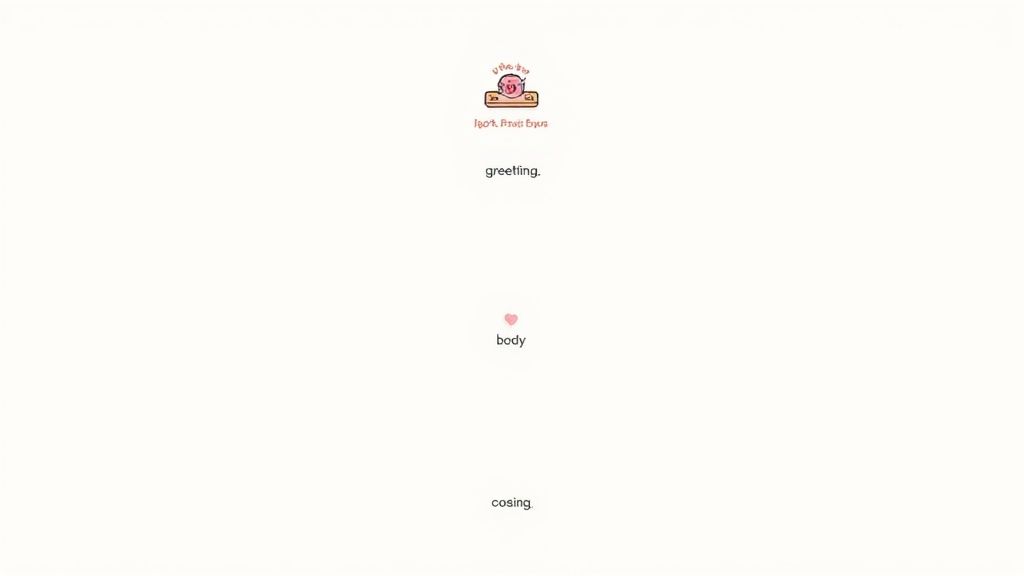
While sending a thank you letter after an interview is generally good practice, a poorly written one can actually hurt your chances. It's not just about sending a note; it's about sending the right note. A misstep here could easily undo all the positive work you did during the interview itself. This means understanding potential problems and knowing how to steer clear of them.
Common Mistakes That Can Hurt Your Chances
Several seemingly small errors can quickly turn your thank you letter into a liability. Typos and grammatical errors, for instance, give the impression of carelessness and undermine your credibility. This is especially damaging for positions requiring strong written communication skills. Sending a generic, impersonal letter also suggests a lack of genuine interest in the specific role and the company.
Another significant mistake is simply rehashing your resume. Your thank you note shouldn't repeat information already in your application. Instead, it should highlight key takeaways from your conversation and reinforce your enthusiasm for the opportunity. And of course, exaggerating your qualifications or making false claims is a guaranteed way to damage your credibility and remove yourself from consideration.
From Enthusiasm to Desperation: Finding the Right Tone
Getting the tone right in your thank you letter is essential. While showing enthusiasm is important, going overboard with flattery or sounding desperate can be a major turn-off. Aim for genuine interest and appreciation, without seeming insincere or overly eager. This takes careful consideration of your word choices, and maintaining a professional, yet personable, style.
Why Attention to Detail Is Absolutely Critical
The thank you letter is essentially an extension of your interview performance. It demonstrates your attention to detail and level of professionalism. Hiring managers pay attention to these subtleties, and a sloppy or generic letter is a definite red flag. This is especially important in highly competitive fields, where small things can make all the difference. A poorly written thank you note, riddled with typos or grammatical errors, can seriously impact a candidate's chances, sometimes even jeopardizing an offer despite a strong interview showing. For further insight and differing opinions from the finance sector, see this discussion on WallStreetOasis. This reinforces how important it is to proofread carefully and ensure your letter is polished and professional.
Learning From Cautionary Tales
Knowing what not to do is just as important as knowing what to do. Hearing stories of thank you letter mishaps offers valuable lessons. One candidate, for example, submitted a thank you note full of typos and was immediately rejected. Another lost their opportunity by sending a generic letter that failed to mention anything specific from the interview. These examples underscore the importance of writing a personalized and error-free thank you letter. By avoiding these common traps, you can make sure your thank you note strengthens, rather than weakens, your candidacy. It's a final chance to showcase your professionalism and leave a lasting positive impression.
Crafting Your Perfect After Interview Thank You Letter
After a successful interview, a well-crafted thank you letter can significantly improve your chances of landing the job. It's an opportunity to reiterate your interest, demonstrate professionalism, and create a lasting positive impression. This goes beyond a generic "thank you" and requires a personalized message that resonates with the hiring manager.
Structuring Your Thank You Letter for Maximum Impact
An effective thank you letter follows a structured approach, guiding the reader through key points and reinforcing your qualifications. Start by expressing gratitude for the interviewer's time and the opportunity to learn more about the role. This sets a positive and appreciative tone.
Next, re-emphasize your interest in the position and explain how your skills and experience align with the company's needs. Connect your qualifications to the specific requirements discussed during the interview. Mentioning a specific detail from the conversation shows you were actively engaged and genuinely interested.
Finally, reiterate your enthusiasm for the opportunity and your eagerness to proceed in the hiring process. Conclude with a professional closing and your contact information, providing a clear call to action for the hiring manager.
Personalizing Your Message for Multiple Interviewers
If you interviewed with multiple people, personalize each thank you letter. This avoids a generic feel and shows you value each individual's time and contribution. Remember specific discussion points and tailor your message accordingly. For instance, referencing a particular project discussed with one interviewer demonstrates attentiveness.
Content: What to Include and What to Avoid
Keep your thank you letter concise and focused. Avoid summarizing your resume. Instead, expand on points from the interview and provide additional value to your application. Address any concerns that may have arisen and reiterate your qualifications.
For further guidance, explore resources like How to master the art of thank you letters. This offers valuable insights and real-world examples.
Addressing Common Interview Scenarios
Different interview formats require slightly different approaches. For panel interviews, send individual thank you letters to each participant, acknowledging their specific questions and contributions. For informal interviews, maintain professionalism while reflecting the less formal atmosphere.
If you made a mistake during the interview, your thank you letter offers a chance to address it briefly and professionally. For example, if you forgot to mention a key skill, subtly incorporate it while expressing enthusiasm.
Examples and Templates
While personalization is key, using templates can be a helpful starting point. Many online resources provide sample thank you letters for various situations. Adapt these to your specific circumstances, adding personal touches and relevant details from your interview.
To help clarify what constitutes an effective thank you letter, let's examine the following comparison:
To further understand what makes a thank you letter effective, take a look at this table:
Thank You Letter Components: What to Include vs. What to Avoid:
| Letter Component | What Works | What Backfires | Example |
|---|---|---|---|
| Opening | Expressing gratitude for the interviewer's time and reiterating your interest. | Generic greetings or overly casual language. | "Thank you for taking the time to speak with me today about the Marketing Manager position. I enjoyed learning more about the role and the team." |
| Body | Highlighting relevant skills and experiences, connecting them to the position, and mentioning specific discussion points. | Simply summarizing your resume or making generic statements. | "Our conversation about the recent social media campaign for Product X resonated with my experience managing similar projects. My expertise in A and B would allow me to contribute immediately to your team's goals." |
| Closing | Reiterating enthusiasm, expressing a desire to move forward, and including clear contact information. | Sounding overly eager, demanding, or including irrelevant personal details. | "I am very enthusiastic about this opportunity and look forward to hearing from you soon. Please feel free to contact me at (555) 555-5555 or email@example.com." |
This table summarizes key components for crafting a strong and effective thank you letter. By incorporating these strategies, you can reinforce your qualifications and leave a lasting positive impression.
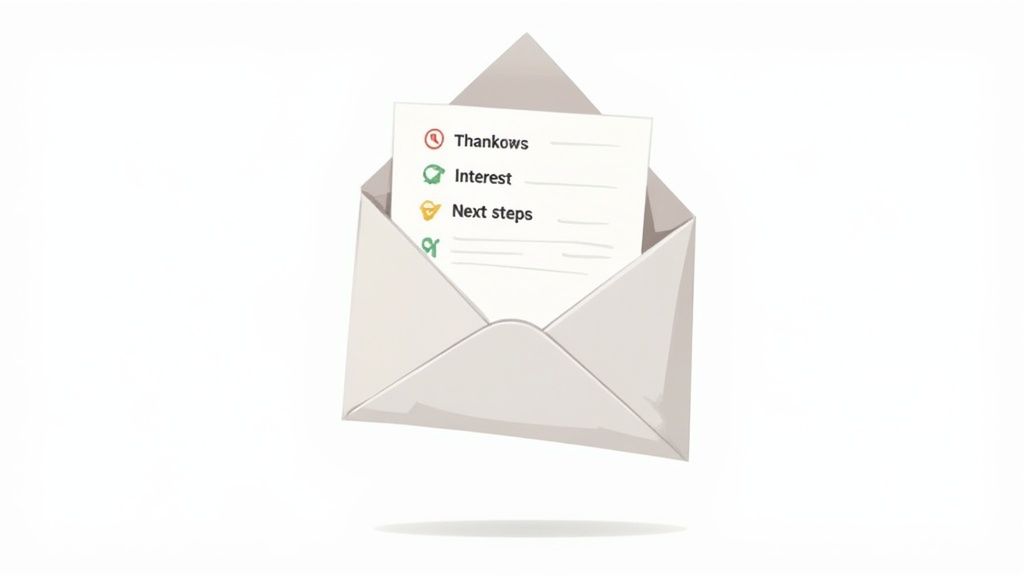
By following these guidelines, you can create a compelling thank you letter that strengthens your candidacy and increases your chances of securing the desired role. This letter is a valuable tool for making a final positive impression.
Timing, Format, and Delivery: Getting the Right Details Right
Sending a thank you letter after an interview is essential. However, the timing, format, and delivery are equally important. These details can significantly influence how your gratitude is perceived. This means considering several factors, from how quickly you respond to your chosen delivery method, ensuring your message makes the best possible impression.
The Importance of Timely Follow-Up
Ideally, send your thank you letter within 24 hours of your interview. This demonstrates promptness and reinforces your interest while the conversation is still fresh in the interviewer's mind. Sending it too quickly, however, such as within minutes of the interview, can appear insincere or automated. Finding the right balance between a prompt response and thoughtful consideration is key.
Email vs. Handwritten Notes: Weighing the Pros and Cons
Both email and handwritten notes have their advantages. Email offers speed and ensures your message arrives promptly, crucial in fast-paced hiring processes. Handwritten notes, while requiring more time, add a personal touch and can make you stand out, particularly in creative fields or after informal networking events.
To help you decide which method is best for your situation, let's take a closer look at the pros and cons of each:
To summarize the key differences between email and handwritten thank you notes, refer to the table below:
Thank You Letter Delivery Methods: Email vs. Handwritten Notes:
| Method | Timeline | Professional Impact | Best For | Considerations |
|---|---|---|---|---|
| Within 24 hours | Efficient, Timely | Most situations, especially corporate settings | Easier to track delivery, ensures prompt arrival | |
| Handwritten | 1-2 business days | Personal, Thoughtful | Creative fields, informal meetings, senior executives | May get delayed, requires more effort |
As the table highlights, email is generally the most efficient method for most interview situations, especially in corporate settings. Handwritten notes offer a more personal touch, making them suitable for specific circumstances.
Subject Lines and Email Formatting: Making a Strong Impression
A clear, concise subject line is essential for email thank you notes. Use subject lines that are easy to identify and relevant to the interview. For example, "Thank you - [Your Name] - [Job Title] Interview" is effective. Ensure your email formatting is professional and easy to read on different devices. A visually appealing and well-organized email reflects positively on your attention to detail.
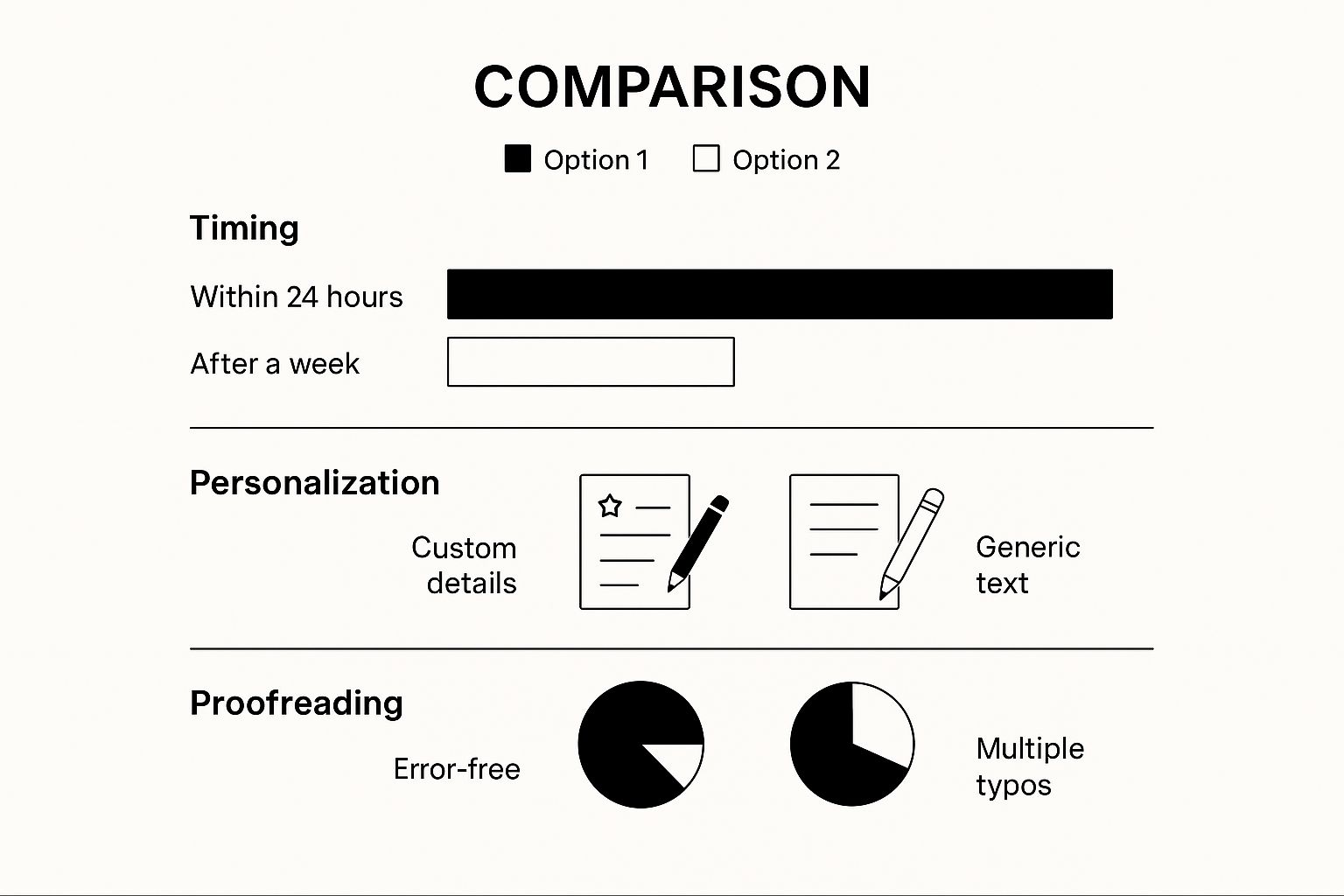
This infographic visualizes the importance of timing, personalization, and proofreading. A timely, personalized, and error-free thank you note can significantly boost your candidacy.
Navigating Multiple Interviews and Time Zones
When interviewing with multiple people, send separate, personalized thank you letters to each interviewer. This demonstrates genuine appreciation for their individual time. When dealing with different time zones, send your thank you letter within 24 hours of the interview in your time zone. This ensures timely delivery without being intrusive during off-hours. Weekend interviews are an exception; sending your message on the following Monday is acceptable. Mastering these nuances can significantly enhance your professional image and improve your chances of success.
Industry-Specific Strategies and Special Situations
Not all thank you letters are the same. Different industries and situations call for unique approaches. Understanding these nuances can significantly impact your job prospects. This means considering the specific company culture and the nature of the role.
Tailoring Your Approach for Different Industries
Expectations for thank you letters vary across industries. In corporate environments, a formal email sent within 24 hours is generally expected. Startups, however, might appreciate a slightly less formal approach, reflecting a more casual culture. This could mean a more conversational tone while still remaining professional.
For technical roles, highlighting specific technical skills discussed during the interview can be beneficial. For creative positions, showcasing your creativity and enthusiasm can be a strong differentiator. This might involve referencing a specific project or expressing your unique perspective.
Traditional industries often value formal communication, while modern tech companies might appreciate a more concise and direct approach. This understanding helps you craft a thank you letter that resonates with the company culture. It's about matching your communication style to the industry's norms.
Handling Special Interview Situations
Group interviews require individual thank you letters to each interviewer, acknowledging their specific questions and contributions. This personalized approach shows you value their time and insights. Remote interviews also require a prompt and professional thank you letter. You might be interested in: How to master remote interviews.
For informal coffee meetings or networking events, a handwritten note can be a thoughtful gesture. This demonstrates genuine appreciation and helps you stand out. If you've interviewed with the same company multiple times, each thank you letter should build on the previous one, referencing earlier discussions and adding new insights.
Guidance for Different Career Stages
Recent graduates can use their thank you letter to express enthusiasm for starting their career and willingness to learn. This positive attitude is valuable for entry-level positions. Career changers can emphasize their transferable skills and explain their transition to a new field. Highlighting relevant experience and demonstrating commitment are key.
Senior-level professionals should reiterate their leadership experience and strategic thinking abilities. This reinforces their value and potential contribution at a higher level. When following up, maintain a professional tone in your email. Refer to these business email writing tips for guidance.
Real-World Examples and Adaptation
Analyzing successful thank you letters from various sectors provides valuable insights. These examples demonstrate how candidates adapt their messaging while maintaining professionalism.
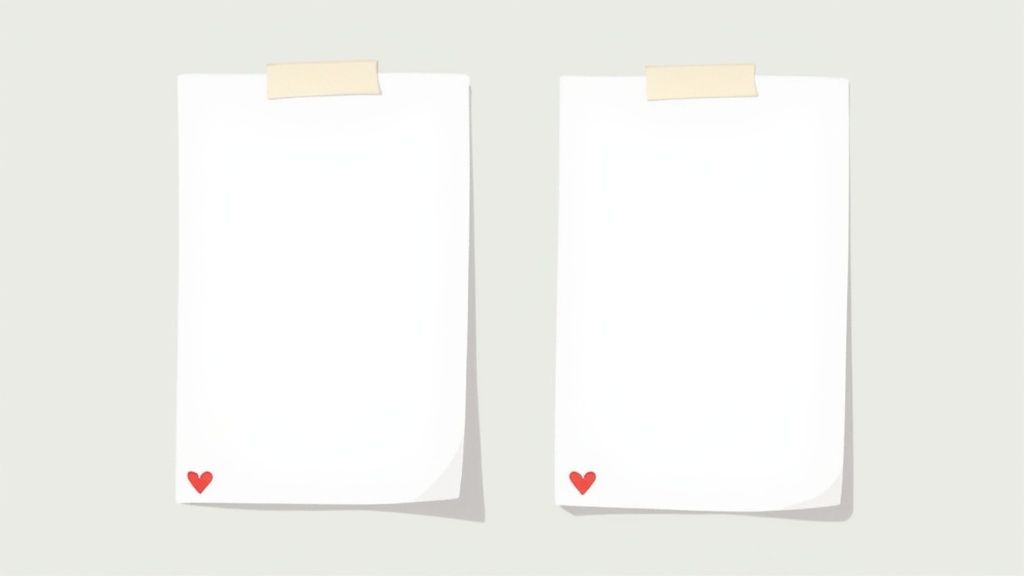
For example, a thank you letter for a marketing position might highlight the candidate's understanding of the target audience, while one for a finance role might emphasize analytical skills. Adapting your message based on the role and company culture is crucial for a strong impression. This shows genuine interest and increases your chances of success.
Your Action Plan for Interview Follow-Up Success
After mastering the art of writing a compelling thank-you letter after an interview, the next crucial step is developing a solid follow-up strategy. This involves more than just sending a single thank-you note; it's about effectively managing the entire post-interview process. A proactive and organized approach will maximize your chances of landing the job.
Creating a Systematic Follow-Up System
A systematic approach to following up will keep you organized and confident. It's about establishing a process that helps you track communications, manage expectations, and remain top-of-mind with hiring managers, significantly improving your chances of success.
Create a Spreadsheet: Use a spreadsheet like Google Sheets or Microsoft Excel to track each job application, including contact information, interview dates, and follow-up activities. This simple tool provides a centralized view of your job search progress.
Set Reminders: Use calendar reminders to prompt follow-up actions. This ensures timely communication without appearing overly eager.
Prepare Templates: Draft thank-you letter templates for different scenarios, such as panel interviews or informal conversations. Remember to personalize these templates before sending, adding specific details from each interview.
Handling Different Interview Scenarios
Different interview types require distinct follow-up strategies. For example, after a panel interview, send individual thank-you letters to each participant, referencing specific questions or discussions you had with them. If you're interviewing with multiple companies simultaneously, your tracking system becomes even more critical. It will help you manage different timelines and personalize your communications effectively. Learn more about effective follow-up in this helpful article: How to master the application follow-up process.
Following Up Without Being Pushy
Knowing when and how to follow up requires a delicate balance. Following up too soon can seem aggressive, while waiting too long might signal disinterest. A good rule of thumb is to wait about a week after sending your thank-you letter before following up again. This demonstrates continued interest while respecting the hiring manager's time.
Polite Persistence: If you haven't heard back within a reasonable timeframe, a polite follow-up email is perfectly acceptable. Reiterate your interest and inquire about the decision timeline.
Respecting Boundaries: Avoid excessive follow-up. If you've sent multiple emails without a response, it might be time to move on.
Reading the Signals: Pay attention to the hiring manager's communication style. If they mentioned a specific timeframe for a decision, respect that timeline. If they were less specific, a gentle follow-up after a week or two is appropriate.
Maintaining Momentum and Staying Positive
The job search process can be challenging, and waiting for responses can be stressful. Maintaining momentum and staying positive are essential for long-term success. This involves actively networking, continuing to refine your skills, and celebrating small wins along the way.
Focus on What You Can Control: Concentrate your energy on what you can control: preparing for interviews, networking effectively, and presenting yourself professionally.
Learning from Every Experience: View each interview as a learning opportunity, regardless of the outcome. Identify areas for improvement and refine your approach for future interviews.
Staying Engaged and Informed: Keep learning about your industry and expanding your professional network. This helps you stay informed about new opportunities and builds valuable connections.
Realistic Timelines and Red Flags
Understanding realistic hiring timelines is important for managing your expectations. Hiring processes can vary significantly depending on the company and the specific role. Be prepared for potential delays and avoid jumping to conclusions. If the hiring process seems unusually slow or disorganized, it could be a red flag. This warrants careful evaluation and possibly reconsidering your interest.
By implementing these strategies, you can effectively manage your post-interview communication, demonstrate professionalism, and significantly increase your chances of landing your dream job. Influencer Marketing Jobs is a valuable resource for connecting with top companies in this exciting field. Visit the site today to explore the latest opportunities and take the next step in your influencer marketing career.